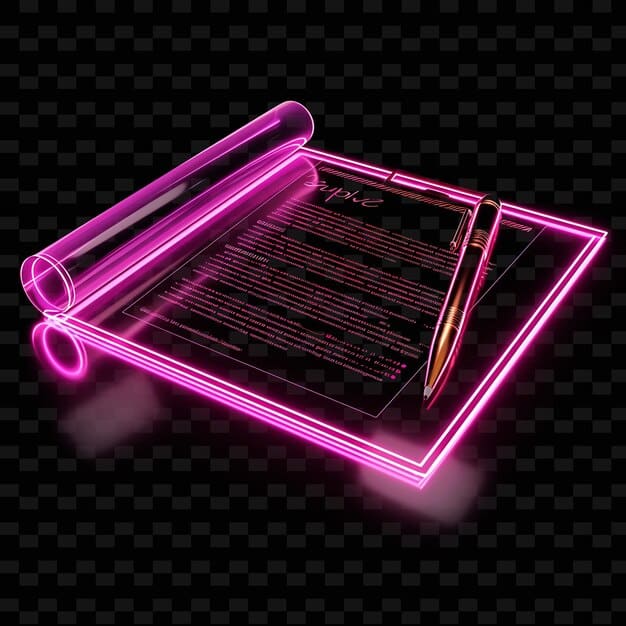Music Licensing for Underground Rap: Navigating New Opportunities in 2025

Music licensing for underground rap in 2025 presents a dynamic landscape shaped by emerging technologies, evolving legal frameworks, and innovative platforms, creating new opportunities and challenges for artists and rights holders within this niche genre.
The landscape of music licensing for underground rap: new opportunities and challenges in 2025 is rapidly evolving. Independent artists navigate this space with an increasing need to understand the nuances of copyright, royalties, and emerging technologies that are reshaping how music is distributed and monetized.
Understanding the Evolving Music Licensing Landscape
The world of music licensing is undergoing a significant transformation, driven by technological advancements and changing consumption habits. This evolution presents both opportunities and challenges.
The Impact of Streaming Services
Streaming services have become the primary means of music consumption, impacting how artists and rights holders generate revenue. Navigating licensing agreements with these platforms is vital.
The Rise of User-Generated Content
Platforms like TikTok and YouTube have fueled the growth of user-generated content, creating complexities around music usage and licensing. Understanding fair use and obtaining proper licenses is crucial.
- Digitalization: Shift from physical to digital formats.
- Globalization: The worldwide reach of music.
- Democratization: Easier access to music production and distribution.
- Data analytics: Understanding consumption patterns and royalty distribution.
In conclusion, The evolving music licensing landscape requires adaptability and knowledge of current industry trends to fully utilize the opportunities.

New Platforms and Technologies for Underground Rap Artists
Emerging platforms and technologies are redefining how underground rap artists distribute and monetize their music. Opportunities exist for artists willing to adapt and explore these new avenues.
Blockchain and Smart Contracts
Blockchain technology offers transparent and secure methods for tracking music usage and distributing royalties. Smart contracts can automate licensing agreements.
NFTs and Digital Collectibles
Non-fungible tokens (NFTs) provide new ways for artists to sell exclusive content, build community, and generate revenue. These resources create new ways for independent artists to thrive.
- Decentralized music platforms: Platforms that prioritize artist control and fair compensation.
- AI-powered music creation tools: AI platforms simplify processes.
- Virtual concerts and metaverse opportunities: The digital world is growing.
- Direct-to-fan engagement platforms: Direct engagement for a long-time fan.
In conclusion, integrating novel platforms and technologies allows underground rap artists to discover new revenue streams and engage with their audience.
Navigating Copyright and Intellectual Property in 2025
Understanding copyright and intellectual property laws is essential for underground rap artists to protect their creations and avoid legal issues. Knowledgeable musicians stay aware of the ins and outs of the industry.
Understanding Copyright Law Basics
Copyright law protects original musical works, including lyrics, compositions, and recordings. Artists should register their copyrights to ensure maximum protection.
Fair Use and Sampling Considerations
Fair use allows limited use of copyrighted material without permission for purposes such as commentary, criticism, or education. Sampling requires clearance and licensing.

- Copyright registration: Registering your work.
- Creative Commons licenses: Utilizing different licenses for each project.
- Public domain: Staying aware of public domain works.
- International copyright treaties: Understanding protection worldwide.
In conclusion, a solid grasp of copyright and intellectual property is essential for protecting their work and building a sustainable career.
The Role of Performing Rights Organizations (PROs) in Underground Rap
Performing Rights Organizations (PROs) such as ASCAP, BMI, and SESAC play a crucial role in collecting royalties for public performances of musical works. Underground rap artists ought to realize the value of PROs.
How PROs Collect and Distribute Royalties
PROs monitor radio airplay, streaming, and live performances to collect royalties. They distribute these royalties to songwriters and publishers.
Joining a PRO: Benefits and Considerations
Joining a PRO can provide a steady stream of income for underground rap artists. Consider the different PROs and choose the one that best suits their needs.
- Understanding PRO agreements: Knowledge of requirements.
- Registering songs with PROs: Correct song registration.
- Tracking performance royalties: How to track royalties.
- Alternative royalty collection methods: Keeping collection diversified.
In conclusion, PRO’s are the traditional method, however new methods are available and growing in acceptance regularly.
Monetizing Music: Beyond Traditional Licensing
Underground rap artists are exploring alternative revenue streams beyond traditional music licensing. There is an increasing amount of ways to monetize music these days.
Direct-to-Fan Sales and Subscriptions
Selling music directly to fans through platforms like Bandcamp or Patreon allows artists to retain a larger percentage of revenue. Subscriptions provide a recurring income stream.
Merchandise, Partnerships, and Brand Deals
Selling merchandise, partnering with brands, and securing endorsement deals can provide additional income. It is important for rappers to take these business opportunities seriously.
- Creating exclusive content: Creating special material.
- Building a strong online presence: Cultivating a community.
- Leveraging social media for promotion: Knowing how to promote.
- Exploring crowdfunding options: Using crowdfunding to engage the community.
In conclusion, diverse monetization strategies let underground rap artists to develop independent and productive careers.
Challenges and Pitfalls to Avoid in Music Licensing
Underground rap artists face several challenges and potential pitfalls in music licensing. Knowing the potential threats allows you to successfully navigate the landscape.
Lack of Knowledge and Legal Representation
Many independent artists lack the necessary knowledge and legal representation to navigate complex licensing agreements. Seeking professional advice is essential.
Underestimating the Value of Music
Artists often underestimate the value of their music and may agree to unfavorable licensing terms. Properly assessing the value of work leads to appropriate compensation.
- Understanding the fine print: Reading the fine print.
- Avoiding predatory contracts: Be aware of companies that take advantage of artists.
- Protecting against copyright infringement: Registering your work.
- Negotiating fair royalty rates: Royalty rates are negotiable.
In conclusion, by being proactive and informed, underground rap artists can avoid common mistakes and ensure a productive career.
Future Trends in Music Licensing for Underground Rap
Several key trends will shape music licensing for underground rap in the coming years. Staying ahead of the curve allows you to capitalize on developments in the technology and culture.
AI and Machine Learning in Music Licensing
AI and machine learning technologies can automate licensing processes, identify copyright infringement, and personalize music recommendations. These technologies can improve artists work flow.
The Metaverse and Virtual Music Experiences
The metaverse offers new opportunities for artists to perform, collaborate, and monetize their music in virtual environments. Virtual experiences may become more normal.
- Increased transparency and efficiency: Transparency in royalty collection.
- Decentralized licensing platforms: Artist control.
- Micro-licensing and fractional ownership: Fair return in shared music.
- Global expansion of music markets: International business.
In conclusion, embracing these trends can empower underground rap artists to thrive in the ever-evolving music industry.
| Key Point | Brief Description |
|---|---|
| 🎵 Streaming Impact | Streaming services are key; understand licensing agreements. |
| 💡 NFTs | NFTs offer ways to sell content and build community. |
| ©️ Copyright | Copyright protection is vital. Register your work. |
| 🤖 AI Influence | AI automates licensing and identifies infringement. |
FAQ
▼
Music licensing is the process of obtaining permission from the copyright holder to use copyrighted music. This ensures that the rights holder is compensated for the use of their work.
▼
Music licensing is vital for revenue generation and preventing legal issues from copyright infringement. It allows artists to control how their work is used and compensated.
▼
Blockchain improves transparency and efficiency within the licensing workflow. It allows for automated royalty distribution and provides immutable usage records, reducing disputes.
▼
PROs collect royalties from public performances of musical works. By joining a PRO like ASCAP or BMI, artists can receive compensation for their music played on radio, TV, or in venues.
▼
Alternative methods include direct-to-fan sales, merchandise, brand partnerships, and NFTs. These approaches allow musicians to use alternate content creation and leverage community support.
Conclusion
As underground rap evolves through 2025, artists must adapt to remain competitive and creative. Being aware allows each artist to thrive in a competitive market.





